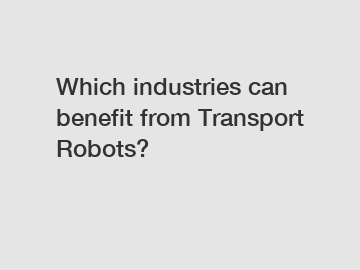Which industries can benefit from Transport Robots?
Which industries can benefit from Transport Robots?
Transport robots, also known as autonomous mobile robots (AMRs), have revolutionized the way goods are moved within industries. These robots have established themselves as game-changers across a wide range of sectors. Industries such as manufacturing, warehousing and logistics, healthcare, and retail have witnessed significant improvements in efficiency and productivity due to the adoption of transport robots.
In the manufacturing industry, transport robots have played a crucial role in streamlining the production process. These robots can transport materials and components between different workstations, eliminating the need for manual labor. This not only reduces the risk of errors but also ensures a continuous flow of production, leading to increased output and cost savings. Moreover, with the ability to work alongside human workers, transport robots enhance collaboration and improve overall operational efficiency.

Warehousing and logistics is another industry that has greatly benefited from transport robots. These robots are capable of autonomously navigating through warehouse shelves and picking up items with precision. With their ability to operate 24/7 and handle heavy loads, they can significantly speed up order processing and fulfillment. This not only enables businesses to meet customer demands more efficiently but also reduces labor costs and minimizes human errors. Furthermore, the use of transport robots in this industry enhances warehouse safety by reducing the risk of accidents and injuries associated with manual material handling.
In the healthcare sector, transport robots have revolutionized the way medical supplies, equipment, and medications are transported within hospital premises. These robots can securely and swiftly move items from one department to another, ensuring prompt delivery and minimizing delays in patient care. Additionally, transport robots reduce the burden on healthcare professionals by taking care of time-consuming tasks such as delivering lab samples or retrieving medication, allowing medical staff to focus more on direct patient care. This technology has proven to be particularly valuable during the COVID-19 pandemic, where social distancing and minimizing human contact are crucial in preventing the spread of the virus.
The retail industry has also witnessed the positive impact of transport robots. These robots can efficiently handle inventory management, ensuring shelves are stocked and items are readily available for customers. By automating tedious and time-consuming tasks such as restocking and inventory tracking, retail businesses can optimize their operations and provide a seamless shopping experience for customers. Furthermore, the use of transport robots allows employees to focus on customer service and personalized interactions, enhancing customer satisfaction and loyalty.
In conclusion, transport robots have emerged as a boon for various industries. Their ability to streamline operations, increase productivity, reduce costs, and improve safety has made them indispensable in manufacturing, warehousing and logistics, healthcare, and retail sectors. As technology continues to advance, it is expected that the adoption of transport robots will only increase, further revolutionizing the way industries operate. It is imperative for businesses to embrace this transformative technology to stay competitive and agile in the ever-evolving market.
Are you interested in learning more about 2 Ton Stand On Type Electric Pallet Truck, HULKMAN AMR, 1.5 Ton Very Narrow Aisle Forklift? Contact us today to secure an expert consultation!


